-
 Art of Wellness Acupuncture & Traditional Chinese Medicine (TCM)11704 Wilshire Blvd, Suite 295, Los Angeles, CA, 90025
Art of Wellness Acupuncture & Traditional Chinese Medicine (TCM)11704 Wilshire Blvd, Suite 295, Los Angeles, CA, 90025
myartofwellness@gmail.com310-451-5522 Office Hours
MonClosedTue7:30 am --4 pmWed7:30 am --4 pmThu7:30 am -- 4 pmFri7:30 am -- 4 pmSat7:30 am -- 4 pmSunClosedOur office opens from Tuesdays to Saturdays 7:30 am to 4 pm, will be closed on Memorial day, Independent day, Labor day, Thanksgiving day, Christmas and New year.
-
Recent Posts
- Chinese New Year 2026: Year of the Horse
- Acupuncture and TCM Treatment for Perimenopause Symptoms
- How to Treat Insulin Resistance With Acupuncture and TCM
- How to Treat Metabolic Syndrome With Acupuncture and TCM
- How to Treat Syncope With Acupuncture and TCM
- How to Treat Thoracic Outlet Syndrome With Acupuncture and TCM
- How to Treat Dupuytren’s Contracture With Acupuncture and TCM
- How to Treat Nutcracker Syndrome With Acupuncture and TCM
- How to Treat Rosacea With Acupuncture and TCM
- How to Treat Perioral Dermatitis With Acupuncture and TCM
- Lymphatic Drainage With Acupuncture and TCM
- How to Treat Turf Toe With Acupuncture
- How to Treat Nerve Pain With Acupuncture and TCM
- How to Treat Watery Eyes With Acupuncture and TCM
- How to Treat Ovarian Cysts With Acupuncture and TCM
- How to Treat Dystonia With Acupuncture and TCM
- Sign up to receive news and updates and get my free report:“The Top 10 Reasons to Try Acupuncture”

November 2025 M T W T F S S 1 2 3 4 5 6 7 8 9 10 11 12 13 14 15 16 17 18 19 20 21 22 23 24 25 26 27 28 29 30
Traditional Chinese Medicine
The Ultimate Guide to the Acupuncture Point on Head for Headaches
by Xiaomei Cai, L.Ac., Ph.D. & Qineng Tan, L.Ac., Ph.D.
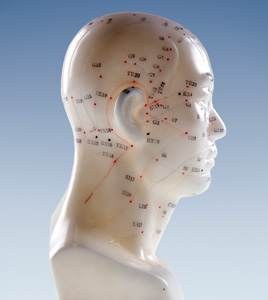
Why does the TCM doctor always put an acupuncture needle in top of head? If you’ve had acupuncture before, it’s likely that your acupuncturist used some acupuncture points on head during your treatments. Using pressure points on the head is something TCM doctors do often, because there are so many useful acupressure points on the head, especially acupuncture points top of head. There are head pressure points for headaches, points to relieve migraines, acupressure head points to help anxiety, fatigue, allergies, and many other conditions.
Even if you’re coming in for acupuncture to help some other condition, whether it’s chronic pain, an autoimmune disease, heart problems, or kidney problems, probably at some point your acupuncture practitioner is going to use acupoints on head to help you relax during your treatment. Every single person who comes into our office for acupuncture is suffering from some form of stress, and using certain points on the top of the head can help with stress relief right away.
Other common reasons to use pressure points in neck and head include:
- to fight fatigue
- headache and migraine
- allergies, asthma, hives, rhinitis, sinus problems, common cold
- anxiety
- nervous disorders
- thyroid disorders
- hormone imbalances
- more mental focus, improved memory and cognition
- tinnitus, ringing in the ears
- vertigo, Meniere’s disease
- toothache, dental pain, dental anxiety
Why are pressure points on the head so powerful? To answer this question, let us explain a bit about the meridian system in TCM.
TCM Meridian Head Points
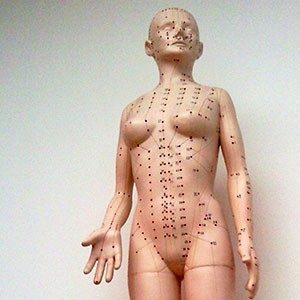
TCM is based on interdependent systems of organs and energy channels that run through the body. The channels are known as meridians, and along them flows Qi, the life energy that animates the body and all of its functions. There are 12 major meridians and 8 major vessels; the meridians are close to the surface of the skin, and the vessels, which essentially connect all the meridians, are deeper inside the body. While the way in which we think of the meridian pathways is more metaphorical than physical in nature, they can be considered roughly analogous to the circulatory system of blood vessels or the network of nerves of the nervous system as we think of them in conventional Western medicine.
Along the meridians lie acupoints, specific points that we stimulate with acupuncture needles during acupuncture treatment or with the fingers and thumbs during acupressure massage. The interconnectedness of the organs, meridians, and individual points is the foundation of acupuncture theory.
We use specific points on a meridian in order to address issues in a particular organ or organ system that corresponds (energetically) with that meridian. There are several pressure points for head and neck pain, points to help relieve allergies, pressure points for frontal headache, and more.
Several of the major meridians originate or end in the head:
- Gall Bladder (GB) meridian – points of the gall bladder meridian wrap around the side of the head, the forehead above the eyebrow, the temple, around the ear, and down the back side of the neck–just as the pain of a migraine often does. Then it continues down from the intersection of the neck and shoulder, zig-zagging across the torso, and finally running down the leg and ending in the fourth toe. This meridian is used to treat severe headaches, stress, tension that affects the shoulder and neck, and bile-related problems.
- Large Intestine (LI) meridian – begins at the points of the index finger, travels up the arm, through the shoulder and neck, then comes up to the lower corner of the nose. This meridian is involved in “letting go,” both from the eliminatory organs of the lower body, and exhalations from the nose.
- Stomach (ST) meridian – the ST meridian starts near the eye, swoops up to the side of the top of the head, comes down next to the mouth, and continues down through the neck, chest, center of the body, down the leg, ending at the point of the second toe. This meridian is used to treat Shen (spirit) disorders, like insomnia, anxiety, palpitations, memory problems, and blood deficiency.
- Small intestine (SI) meridian – originates in the little finger, runs up the arm into the shoulder and then branches out, some of it going into the major organs of the heart, stomach, and small intestine; then other branches go up into the face, by the cheekbone and right in front of the center of the ear. The SI is used to treat fevers and mental health conditions, among other things.
- Bladder (UB) Meridian – begins at the inner canthus of the eyes, goes up and over the top of the head, about an inch away from the midline on either side, and then all the way down the back and leg, ending in the little toe. Used to help with invasion disorders (wind, cold, heat etc.) that affect the eyes, sinus headaches, allergies, stuffy head, neck pain and stiffness.
- Triple burner meridian, also known as San Jiao (SJ) – begins at the tip of the ring finger, then goes up the arm, through the shoulder and chest, up the side of the neck and comes up around the ear, and into the temple and outer brow bone. The San Jiao head points are used to work on dizziness, headaches, eye twitching, and dental pain.
- Conception vessel – also known as the Functional Channel, or the Front Channel, or Ren Mai, this vessel originates at the navel, then drops down to the perineal area, and runs back up the center of the front of the body, ending in a point on the chin, in the dip just under the lower lip. This vessel controls the Yin energy of the body and is essential to the health of the reproductive organs and fertility.
- Governing vessel, also known as the Extraordinary vessel, the “Sea of Yang” or Du Mai – originates in the lower back near the kidneys, runs up the spine and around and over the top of the head, ending in the middle of the face. This vessel controls the Yang energy of the body, and in particular the kidneys, the back and spine.
Top 10 Acupuncture Points on Head
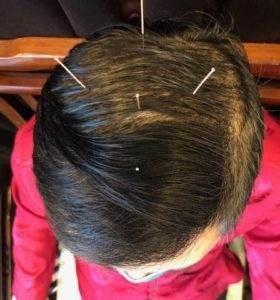
Of course, your acupuncturist will not only use acupoints on your head during a treatment session. We choose a variety of points that will work together to alleviate symptoms and help optimize the functioning of the organs. These specific head points may be used as part of a treatment to work on a specific symptom or condition:
- Yin Tang, or the “Hall of Impression” – this is what is called an “extraordinary point,” meaning it doesn’t really belong to a meridian; it stands on its own. Right in the third eye, it is used to reduce anxiety, vertigo (dizziness), help promote better sleep, clear wind and congestion, and relieve sinus pain and headache.
- DU21 – Shen Ting, “Spirit Court” – Right in the front middle of the top of the head, about an inch above the hairline. This is one of the pressure points for frontal headache, also good for sinusitis, nosebleeds, anxiety, panic attacks, and sleep problems.
- DU 20 – Baihui, or “The meeting of the 100s” – right in the very center of the top of the head, master of endocrine and nervous system, used for anxiety, fatigue, mental focus, relaxation, hypothyroid, adrenal problems, hormone imbalance, headaches.
- Si Shen Chong – “Four Alert Spirit” – this is actually a set of four “extraordinary points,” which surround DU20. Very helpful for sleep disorders, memory disorders, dizziness, and headaches.
- GB20 – Feng Chi, “Wind Pool,” low back of the head, where the skull meets the neck muscles, helps headaches, migraine, blurred vision, fatigue, neck pain and stiffness. We may use this point when a patient has a cold; this is a point where cold wind can get into the body, and why it is important to wear a scarf to protect your neck when it’s cold and windy out.
- Taiyang “Great Sun” – Right in the depression of the temple, this point can help dizziness, one-sided headaches, migraines, sensitivity to light, and jaw pain, TMJ.
- GV26 Shui Gou – in the mustache area, between the nose and mouth, right in the center of the crease, this point helps to calm the mind and restore mental focus. Also used as first aid when a person faints or is in shock. Helps stop hiccups. Helps with serious neurological disorders like epilepsy, seizures. Also good for low back strain.
- LI20 Ying Xiang “Welcome Fragrance” – located in the lower corner of the nose, right in the nasolabial groove, used to alleviate congestion, allergy itching in the nose, and to clear the nasal passages.
- ST8 – Touwei, about 5 finger widths above the eyebrow, dispels dampness, used for “splitting headaches,” frontal headache, migraines, headache with nausea and/or vomiting, vision problems, tearing eyes, eye twitching, dizziness/vertigo, hair loss. Helps with mental health, when a person is “overthinking” things, or having repetitive thoughts.
- BL2 – Zhanzhu – located at the inner corner of the eyebrow, good for itchy, watery eyes due to allergies, other eyes problems like glaucoma, night blindness, and sinus headache.
Facial Acupuncture Points
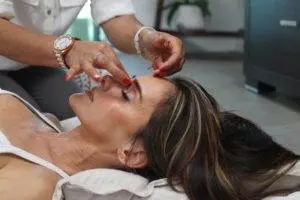
As we have mentioned, some pressure points on the face are used to help relieve sinus congestion, nasal congestion, and other issues related to common colds and flus or allergies. Points on the face may also be used to help the facial paralysis of Bell’s Palsy, or TMJ jaw pain.
Naturally, we also use acupuncture points on the face as acupuncture points for the face, that is, when we are striving for facial rejuvenation. This technique is sometimes called an acupuncture facial. Using points on the face can help to stimulate collagen production, help to tighten the skin, reduce the appearance of wrinkles, and strengthen the facial muscles. People of all ages and genders can benefit from acupuncture skin care. Cosmetic acupuncture can treat signs of aging skin like sagging, puffiness under the eyes, and dryness.
Self-Care With Acupressure Head Points
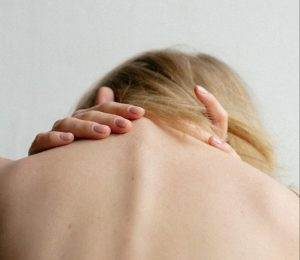
What is acupressure? Acupressure is a form of massage that goes back thousands of years in Chinese Medicine. Stimulating the same points we needle in acupuncture treatment with your fingers and thumbs can be beneficial for different types of headaches and neck stiffness, to calm anxiety, and bring more mental clarity.
Choose a time when your environment is quiet and free of distractions, the same as you would for a meditation practice or home workout. Be sure to breathe deeply and smoothly as you perform self-acupressure. Press firmly, applying deep pressure to a point in a small, gentle circular motion. Giving yourself an acupressure treatment only takes a few minutes, and it is a great way to take care of yourself between acupuncture sessions.
Acupuncture Near Me for Headaches and More
Every time you come in for acupuncture treatment, your TCM doctor is looking for ways to treat your overall condition, but also focusing on how you are feeling right now, today. Often, people are feeling tired and stressed, beyond and in addition to the health condition that caused them to seek out alternative medicine in the first place. Using points on the head that help fatigue, calm a racing mind, and reduce the physical effects of stress is one way that your acupuncturist is practicing preventative care, while at the same time, making sure you leave your treatment feeling rested and reenergized. The next time you come in for a visit, be sure to let us know how you’re feeling, and feel free to ask us, “What is that point on my head for?”
*This article is for education from the perspective of Traditional Chinese Medicine only. The education provided by this article is not approved by FDA to diagnose, prevent, treat and cure human diseases. It should not stop you from consulting with your physician for your medical conditions. Traditional Chinese Medicine is based on Qi, which is an invisible force that usually cannot be observed by modern science. Because science focuses on testing ideas about the natural world with evidence obtained through observation, these aspects of acupuncture can’t be studied by science. Therefore acupuncture and Chinese herbs are often not supported by double-blind, randomized trials, and they are considered alternative medicine therapies in the United States.
How to Treat Hip Pain With Acupuncture and TCM
By Qineng Tan, L.Ac., Ph.D. & Xiaomei Cai, L.Ac., Ph.D.
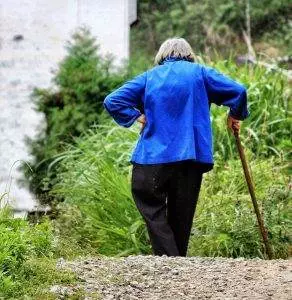
Are you suffering from hip pain symptoms like lower back and hip pain on one side, pain in buttocks shooting down leg, hip pain at night, or hip pain when walking? Several different conditions can cause pain in the hip or pain in the buttocks that radiates down the leg. It could be hip pain due to bursitis or arthritis, or related to sciatic nerve pain or piriformis syndrome. TCM and acupuncture treatment can help relieve pain in the hip, buttocks, and lower back.
The hip joint is very complex; it’s made up of a ball-and-socket bone structure with almost 30 different muscles and tendons surrounding it. Hip pain is common, especially among older adults, although people of any age can be affected by pain in the hip, buttocks, or lower back. It can be difficult to pinpoint the causes of hip pain, as there are many different possible reasons for hip pain, and the aching sensation can move from place to place, or suddenly become more intense. The hip pain location, the quality of the pain, and when it happens can tell us a lot about what is causing pain in the buttock or hip area, so it is important to pay close attention to the type of hip pain. For example, is it sudden hip pain? Hip pain gets worse at night? Is the hip pain worse after sitting for long periods?
What does arthritis in the hip pain feel like? Hip pain that develops slowly over a period of time may be due to osteoarthritis. Other signs of osteoarthritis of the hip include:
- Hip pain worse in the morning, feel better after moving around.
- Grinding sensation, ache, stiffness, soreness, sometimes, hip feels locked up.
- Hip pain that gets worse when start to exercise, but usually gets better once warm up, and worse again after excessive exercise.
- Pain that goes from the hip down to the knee or across the back
This is the type of arthritic hip pain that comes on with age and many years of use, as the cartilage that cushions the hip joint wears down over time. Osteoarthritis of the hip can be more painful when it rains. Left untreated, hip osteoarthritis can cause people to lose mobility and even walk with a limp.
Sharp hip pain or tenderness when you lie on your side or sit down may be due to hip bursitis.
- Hip pain worse at night
- Hip pain stiff when getting up
- Difficulty walking, hard to squat or sit
- General ache all over the back, groin, hip area
Bursitis is inflammation of the small, fluid-filled sacs that provide cushioning around large joints like the hip. The outer part of the hip bone is topped by the trochanteric bursa; when this bursa becomes inflamed, due to a bump or fall, overuse, or some other injury, it can cause pain on the outside of the hip or buttock area.
Gradually worsening hip pain, or feeling stiff and sore in the morning can be a sign of hip flexor tendonitis or tendinitis of the hip. This is caused by inflammation of the tendons and connective tissues in the hip, usually due to high intensity sports activities.
A shooting pain that seems to radiate down from the hip to the leg and even the foot is often a sign of sciatica, a kind of nerve pain. The sciatic nerves extend from the lower spine and branch out into the buttocks and down the legs. When the sciatic nerve is compressed, it can cause numbness, tingling, pins and needles, or radiating pain to shoot from the buttock down one leg. Other sciatica symptoms can include:
- intermittent pain that comes and goes
- weakness in one leg
- sharp pain that feels like a jolt
- burning pain in buttock, burning pain in one leg
- pain that is worse when bending or standing
Sciatic pain can happen due to impingement or a pinched nerve from a herniated disk in the lower spine (lumbar herniated disk), or other spinal problems like spinal stenosis (narrowing of the spine that compresses nerves) or spondylolisthesis (slipped disc).
Radiating pain in the buttock that is similar to sciatic pain can also be caused by problems with the soft tissues of the buttock, especially the piriformis muscle. Inflammation, spasms, or tightness in the piriformis muscle can cause compression of the sciatic nerve, which runs just underneath, or in some cases, through the piriformis. This condition is known as piriformis syndrome.
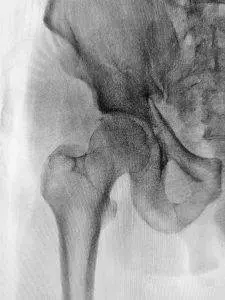
Moderate hip pain is usually treated with medications and/or injections to relieve pain and reduce inflammation, along with perhaps a referral to physical therapy (PT) to help strengthen the muscles of the hip. Severe hip pain that persists beyond treatment with PT and medication may lead to surgery as a last resort. In many cases, TCM methods including acupuncture can help relieve the pain and inflammation of osteoarthritis, sciatica, bursitis, tendonitis, and other causes of hip pain, without the side effects of medications or complications of hip surgery.
Top 10 Hip Pain Causes
Pain in the hip and buttock on one side, pain in the butt, or hip pain can be related to one or more of a variety of conditions affecting the hip joint, the lumbar spine, or the soft tissues of the hip and buttock area. Causes of hip pain can include:
- Arthritis hip pain or Osteoarthritis of the hip – arthritis is a general term for joint pain. Pain in the hip joint can occur due to constant wear-and-tear over the course of many years, leading to inflammation in the hip joint and the breakdown of cartilage.
- Bursitis outer hip pain – swelling and inflammation of the hip bursae
- Sciatica in hip – nerve pain due to compression of the sciatic nerve
- Piriformis syndrome – inflamed or tight muscles in the buttocks compress the sciatic nerve, causing pain or numbness in the buttock, hip, and leg
- Hip Tendonitis – trauma or use injury to the connective tissues of the hip joint
- Sacroiliac joint pain or SI joint pain – the sacroiliac joints connect the hip bones to the lower spine and tailbone. This joint is designed to move subtly; too much or too little movement can cause dysfunction and pain across the low back and hips. It is fairly common for women to experience some SI joint pain (and also sciatica) during pregnancy.
- Muscle strain – if one of the large muscles that makes up the hip joint is stretched past its usual range of motion, hip strain can cause pain and swelling. This can happen during normal daily activities, but most often happens during sports or exercise, possibly if someone has not warmed up adequately.
- Hip dysplasia or Dislocated hip – some people are born with anatomical abnormalities of the hip joint, when the socket part of the joint doesn’t fully fit around the ball part. This can lead to instability in the hip, dislocation of the hip, damage to cartilage, pain in the groin and hip, and higher risk of osteoarthritis.
- Hip fracture – fractures in the hip are common among older people, women especially. A hairline hip fracture or broken hip may cause a vague pain in the lower back, pain in groin, or pain down the leg or knee pain. Hip fractures can lead to other serious problems, like blood clots, infections like UTIs, or pneumonia.
- Hip Labral Tear – a labrum is a piece of cartilage that absorbs shock and helps the functioning of the major joints of the body in various ways. You may have heard of a labral tear in the shoulder that causes shoulder pain; hip labral tear is similar. This could mean overall degeneration of the cartilage, or the labrum becoming detached from the bone, or the formation of a cyst around the area. Injury to the labrum of the hip can cause pain deep in the groin.
How Is Hip Pain Treated?
Hip pain is usually treated initially with anti-inflammatory pain relief medications like NSAIDs. Cortisone injections may also be recommended for conditions like bursitis or hip tendonitis. While cortisone shots for hip pain may help relieve pain in the short-term, repeated injections can cause damage to the area. Cortisone can also raise blood sugar levels, which can be dangerous for people who have diabetes or are at risk for diabetes or metabolic syndrome.
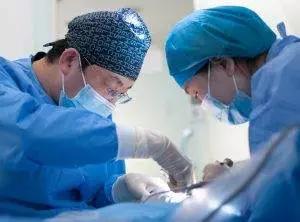
Arthroscopic surgical techniques allow orthopedic surgeons to operate on the hip joint in a minimally-invasive way. This may be done to repair a torn labrum or remove loose cartilage. More complex surgery may be indicated to repair hip dysplasia or serious degeneration due to osteoarthritis. Hip replacement surgery is becoming more common, with over 450,000 total hip replacements currently being performed each year in the U.S. While many people are able to get relief from chronic hip pain through hip replacement, it is a major decision, and there are significant risks involved, including: infections, fractures that occur during the surgery, nerve damage, etc. The risk of blood clots after a hip replacement necessitates taking blood thinners. Even under the best circumstances, the prosthetics that are implanted during a hip replacement do not last forever, and some people may have to have a second operation to replace the replacement.
Acupuncture treatment can help to reduce inflammation and alleviate pain in the hip due to osteoarthritis and other complaints, without the risks of long-term pain medication use.
Can Acupuncture Help Hip Pain?
According to TCM theory, arthritis of the hip is considered a Bi Syndrome, a condition in which stagnation of blood and Qi (life force energy) causes pain and stiffness in the muscles and joints. Cold, wind, and heat are pathogenic factors that cause the blockage of energy moving freely through parts of the body. Imbalances in the organs, such as the kidneys, gallbladder, spleen, and stomach can also contribute to Bi Syndrome hip pain. Standard approaches that seek to alleviate pain do not help treat the problem at the source. A TCM practitioner can address the root source of the blockage and pain with acupuncture and herbal supplementation.
Sciatica nerve pain that affects the buttock, hip, and leg is also considered to be a Bi Syndrome condition, and is due to obstructions in the flow of Qi through the gallbladder and bladder meridians. Acupuncture treatment helps relieve nerve pain by acting as an analgesic, reducing pain signals and increasing the production of endorphins in the body, while reducing inflammation in the surrounding tissues and helping the nerves to heal.
One study of patients suffering sciatic pain who were treated with TCM found that acupuncture alone had an 81.6% efficacy rate for reducing pain symptoms, while acupuncture combined with herbs was 95% effective. A follow-up with patients who had been treated with acupuncture for sciatica related to herniated disc showed that people had experienced long-term positive results.
Tendonitis of the hip and hip bursitis are inflammatory conditions that can also be helped with acupuncture and herbs. A review of acupuncture treatment for pain related to herniated disc concluded that TCM methods worked better than pain medication or traction therapy.
An experienced TCM practitioner will also be able to help you with making changes in your diet and exercise programs that will reduce inflammation while strengthening both your Qi and the muscles of your lower back and hip joints.
Top 5 Tips for Hip Pain
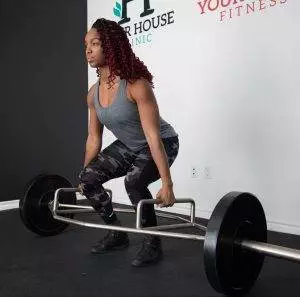
Here are some steps you can take to get rid of hip pain and prevent it from coming back, in addition to getting acupuncture treatment and taking Chinese herbs:
- If lower back pain and hip pain is due to sciatic nerve pain, pinched nerves, or disc problems/herniated disk, it is still important to keep moving your body. Too much time in bed can actually do more harm than good. When exercising, be sure to warm up adequately. Take things slowly, and listen to your body. Vary your exercise to include gentle movement modalities like Tai Qi, which emphasize rotation of the joints. Strength training, working out with weights, is also great to strengthen the major muscle groups that support the back and hips.
- Some conditions, such as a hip labral tear, muscle strain in the hip, or fractured hip, may require rest to heal. It can be difficult to take time out for healing in our modern fast-paced culture, but do your best to use this time to rest well, work on a meditation practice, and make your health your top priority.
- Don’t keep your phone or wallet in your back pocket. This creates imbalance and puts pressure on one side of the hip and pelvis.
- Be sure that your sleeping position helps to reduce stress on the lower back. Using a bolster under your knees may help. Mattresses should be medium-firm.
- Weight management, or losing weight, can help to take a lot of stress off of the joints. An anti-inflammatory diet (avoid spicy foods, and nightshade vegetables: tomatoes, potatoes, peppers, eggplant) will also help.
Acupuncture Near Me for Hip Pain
Hip pain is not something to ignore. Healthy hip joints are vital to continued mobility and quality of life. Sadly, it is well-known that a fractured hip often means the end of an active life for an older person. It doesn’t have to be this way. If you or someone you love is noticing hip pain interfering with life, it may be the time to treat hip pain with acupuncture and herbs. Adding an acupuncturist to your healthcare team for integrative care can make all the difference.
*This article is for education from the perspective of Traditional Chinese Medicine only. The education provided by this article is not approved by FDA to diagnose, prevent, treat and cure human diseases. It should not stop you from consulting with your physician for your medical conditions. Traditional Chinese Medicine is based on Qi, which is an invisible force that usually cannot be observed by modern science. Because science focuses on testing ideas about the natural world with evidence obtained through observation, these aspects of acupuncture can’t be studied by science. Therefore acupuncture and Chinese herbs are often not supported by double-blind, randomized trials, and they are considered alternative medicine therapies in the United States.
How to Treat Irregular Heartbeat With Acupuncture and TCM
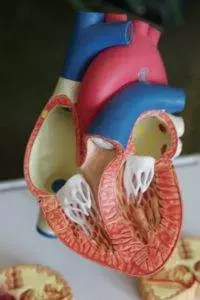
Does if feel like your heart “skips a beat,” or your heart is “fluttering?” Maybe you feel your heart beat is fast or slow, compared to your normal heart rate. Lots of things can cause your resting heart rate to be uneven. Acupuncture and TCM can be beneficial as both an adjunct or alternative to drug therapy for paroxysmal supraventricular tachycardia, paroxysmal atrial fibrillation, and other types of arrhythmia that cause heart palpitations or a fast heart rate.
The pulse rate is controlled by electrical impulses that originate in the sinus node, which is located in the right atrium, or upper chamber, of the heart. The feeling that your heart rhythm is off, or different from your normal pulse rate is called Arrhythmia. The average resting heart rate is 60 to 100 beats per minute. A fast heart rate–more than 100 beats per minute–is called tachycardia. A slow heart rate–less than 60 beats per minute– is called bradycardia.
It is natural to have a slightly high heart rate during or just after exercise, or or a slow heart rate during sleep or times of relaxation, as when meditating. In some cases, a rapid heartbeat is related to anxiety or panic attacks. Sometimes a rapid or irregular heart rate may be related to caffeine consumption or a side effect of some medication. Other times, it may be a sign of heart disease or other chronic condition that needs to be addressed. Other symptoms related to irregular heartbeat include: shortness of breath, chest pain, sweating, and dizziness.
The heart is composed of four chambers; the top two chambers are called the atria, into which blood is received, and the two bottom chambers, the ventricles, from which blood is pumped out to the lungs and the rest of the body. Medical science classifies deviations from a normal resting heart rate both according to their rapidity and the chamber of the heart that seems to be problematic.
There are different medications available to help restore the regular rhythm of the heart, as well as therapies that deliver electrical impulses to the heart through a catheter, and devices, such as pacemakers or defibrillators.
In many cases, arrhythmia is not a serious problem. But in other cases, it can increase the risk of blood clots, stroke, and other life-threatening conditions. It is advisable to consult a medical professional if you are having an irregular heartbeat often enough to be concerned.
Acupuncture and TCM offer a natural way to help restore heart function and a good resting heart rate without the unwanted side effects of medications or invasive procedures.
Top 10 Types of Irregular Heartbeat

There are many different terms that describe deviations from a regular, healthy heart rate. Some irregular heartbeat issues are due to congenital conditions, while others may occur due to trauma, disease, or aging.
- Atrial flutter – an accelerated heart rate that occurs in an organized and rhythmic way due to rapid electric impulses in the atria.
- Atrial fibrillation (AFib or AF) – a rapid heart rate, also caused by increased electrical impulses in the atria that happen in a chaotic, arrhythmic way. Fibrillation refers to the rapid and irregular movement of muscles. In the case of AFib, the upper chambers of the heart quiver quickly. This condition is associated with stroke. AFib with RVR (rapid ventricular response) is a condition that occurs when patients are critically ill, often in the ICU, when the atrial fibrillation causes the ventricles to beat faster.
- Ventricular fibrillation – rapid impulses in the ventricles (the lower chambers of the heart) cause ineffective pumping of blood out to the body.
- Supraventricular tachycardia – this refers to types of arrhythmia that originate in the atria (above the ventricles) and cause brief episodes of accelerated heart rate.
- Ventricular tachycardia – a fast but regular heart rate that does not allow the ventricles to fill with as much blood as usual.
- Sick sinus syndrome – more common among older people, this is when the sinus node is malfunctioning and may sometimes cause a fast heart rate, and other times, a slow heart rate.
- Long QT Syndrome – a heart disorder found in people with a particular genetic mutation that causes rapid heartbeat and fainting spells.
- Wolff-Parkinson-White Syndrome – some people are born with an extra electrical pathway that can cause extra or irregular signalling to occur.
- Conduction Block – a block of the electrical pathways that sometimes results in a slower heart rate.
- Premature ventricular contractions – this is when an extra heartbeat beat originates from the ventricles, rather than the atria. It can feel like a “skipped” beat, or your heart pounding or jumping in your chest, but it is actually a kind of extra beat. This can happen occasionally due to drug stimulants like caffeine or nicotine, or other medications like decongestants or antihistamines. It can also be due to heart disease creating scarring in the ventricles or in the structural parts of the heart that hold the pathways for electrical impulses.
Atrial fibrillation increases the risk of blood clots and strokes because blood is not being effectively pushed from the atria into the ventricles, so blood pools or collects in the atria.
What Causes Irregular Heartbeat?
In general, most types of arrhythmia are caused by some disorder of the electrical conduction system that controls the beating of the heart valves, or weakness of the heart itself, which is known as cardiomyopathy.
Causes of tachycardia include:
- Not enough blood nourishing the muscles of the heart.
- Dilation or one or more valves of the heart, meaning that the muscle tissue becomes thinner and the chamber becomes enlarged.
- Thickening of the walls of the heart chamber makes them stiff; this is known as hypertrophic cardiomyopathy.
- Scar tissue makes the heart tissue more rigid (restrictive cardiomyopathy or dysplasia). This can happen due to inflammation, high levels of iron or protein in the tissues, sometimes as a side effect of cancer treatments (radiation and/or chemotherapy). Arrhythmic right ventricular dysplasia may be an inherited condition.
Causes of atrial fibrillation or atrial flutter include:
- High blood pressure
- damage to the heart from a heart attack or heart surgery
- Coronary artery disease
- Congenital heart defects
- Hyperthyroidism
- Lung disease, infections, or pneumonia
- Sleep apnea, snoring
- Smoking or overuse of other chemical stimulants
Chronic conditions like diabetes, obesity, metabolic syndrome, kidney problems, alcoholism, Parkinson’s disease, or a family history of heart problems increase a person’s risk for developing an arrhythmia.
Treatment for Irregular Heartbeat
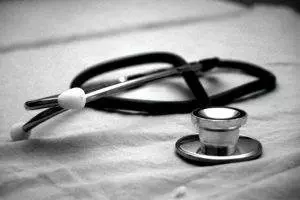
There are several different types of medications to treat irregular heartbeat. Tachycardia may be treated with antiarrhythmic drugs, which work by suppressing or depressing the electrical impulses that are misfiring or transmitting signals too quickly. Beta blockers slow down the heart rate and reduce blood pressure by reducing the production of adrenaline. AFib treatment often involves anticoagulants or blood thinners, which prevent the formation of blood clots. In some cases, these medications can work to help people maintain a steady heart rate and prevent serious events like strokes. The downside is that they must be taken daily on an ongoing basis, and in some cases, they can actually cause the heartbeat to become even more erratic.
Medical procedures that are designed to help irregular heartbeat include: electrical cardioversion, in which an electric shock is used to help “reset” the heart rate, and ablation, in which the tissues that contain the electric impulse pathways are intentionally scarred in order to reduce their output. Implantable devices such as defibrillators or pacemaker monitor the heart rate and deliver small “shocks” to alter the rhythm of the heartbeat. For some people, these methods work to keep the heart functioning. In some cases, though, the surgery to implant the device causes complications or damage to critical tissues around the heart or lungs.
Can Acupuncture Help Irregular Heartbeat?
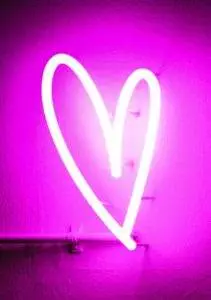
In conventional medicine, and indeed, in Western culture, the heart is seen as one of the most important, if not the most important, organ in the body. Not only does it supply the whole body with oxygenated blood, but it also is associated with our deepest emotions. TCM also views the heart as a central organ that governs the blood and vessels, and also the mind and spirit.
The traditional diagnostic methods employed by TCM practitioners can tell us a lot about the health of the heart. The feeling of the pulse gives us detailed information about the strength, quality, and speed of the heart rate. According to TCM theory, the heart “opens” out into the face, and so observing the pallor or color of the face, the brightness of the eyes, and the appearance, especially, of the tongue, also gives the acupuncturist vital information about the heart.
TCM providers classify different causes of irregular heartbeat by looking at the whole concert of presenting symptoms:
- Heart Qi deficiency or Blood deficiency: may happen after a long illness or loss of blood and be marked by heart palpitations, dizziness, memory problems, and/or insomnia. The pulse will be weak, and the tongue pale pink.
- Kidney yin deficiency with Heart Fire: chronic illness can deplete the kidneys so that they can no longer manage the balance of fluids and heat, so heat rises and disturbs the Heart. With this presentation, a person may be experiencing strong feelings of fear or anger, depression, ringing in the ears (tinnitus), and stomach problems.
Depending on the type of arrhythmia, the acupuncturist will choose acupuncture points and herbs to clear heat and dampness, nourish the blood, and calm and strengthen the heart. Specific herbal formulae work to activate and maintain blood flow, removing stasis, while also helping to protect the spleen and stomach.
A controlled study that compared patients with arrhythmias and tachycardias who were treated with medication (Lopressor) versus patients treated with both the medication and acupuncture and Chinese herbal formulations. The patients who received integrative care showed statistically very significant improvement over the patients using medication only.
A systematic review of randomized trials that compared acupuncture treatment versus typical medication treatment found that both types of treatment were equally effective for paroxysmal supraventricular tachycardia, that acupuncture in addition to medication was effective for ventricular premature beat, and that acupuncture was beneficial over no treatment at all for sinus tachycardia.
Acupuncture Near Me for Irregular Heartbeat
Unfortunately, cardiovascular disease is the leading cause of death among Americans. Over five million people in the U.S. experience atrial fibrillation, or heart flutter. The conventional methods of treating heart problems such as AFib and other types of arrhythmia can work, but they require people to become completely dependent upon medications or devices. These methods of treatment are also very expensive. Acupuncture and TCM offer an alternative or adjunct approach that can help improve heart function and restore a healthy heart rate without side effects.
*This article is for education from the perspective of Traditional Chinese Medicine only. The education provided by this article is not approved by FDA to diagnose, prevent, treat and cure human diseases. It should not stop you from consulting with your physician for your medical conditions. Traditional Chinese Medicine is based on Qi, which is an invisible force that usually cannot be observed by modern science. Because science focuses on testing ideas about the natural world with evidence obtained through observation, these aspects of acupuncture can’t be studied by science. Therefore acupuncture and Chinese herbs are often not supported by double-blind, randomized trials, and they are considered alternative medicine therapies in the United States.
How to Treat Hemorrhoids With Acupuncture and TCM
By Xiaomei Cai, L.Ac., Ph.D. & Qineng Tan, L.Ac., Ph.D.
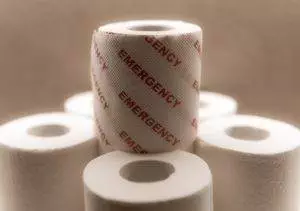
Bleeding and discomfort when you go to the bathroom? Burning or itching around the anus? Hemorrhoid pain is caused by swollen blood vessels around the rectum. Acupuncture and TCM reduce inflammation and can bring swift hemorrhoid relief.
Sometimes called “piles,” (from the Latin “pila,” meaning “balls”), hemorrhoids often do resemble little balls or clusters of grapes. The word “hemorrhoid” actually refers to the specific formation of blood vessels and cushioning tissues that surround the anus. Colloquially, though, the term is usually used to describe the condition of inflammation and irritation that can occur in this area.
Hemorrhoids are very common; probably more than half the population experiences them at some point in their life. However, the discomfort of talking to a doctor about hemorrhoids can be almost as miserable as the physical discomfort of having them, so many people avoid getting hemorrhoid help.
How do you know if you have a hemorrhoid? Sometimes people have a lot of itching, burning and discomfort after a bowel movement, or throughout the day. Sometimes there is no pain, but you may see a little bit of blood in the toilet bowl, or when you wipe with toilet paper. When you touch the area, you may feel a lump, or swollen tissue.
Hemorrhoids are generally classified into two categories based on their location: internal hemorrhoid and external hemorrhoid. Internal hemorrhoids form inside the anus and lower rectum and can cause bleeding, usually without pain. In some cases, though, the swollen veins can protrude out from the anal sphincter during or after a bowel movement and then need to be pushed back in. This is called a “prolapsed internal hemorrhoid.” The situation can become more serious if the internal hemorrhoid can’t be pushed back in, or if a blood clot develops in the vessel (thrombosis); then, it becomes painful to go to the bathroom, or even sit. In some cases, a prolapsed hemorrhoid becomes “strangulated,” meaning the blood supply is cut off, which can cause severe pain. Hemorrhoids become prolapsed because the connective tissues in the area weaken due to intense pressure, usually due to straining during a bowel movement, or because of the extra weight of pregnancy or obesity.
External hemorrhoids develop outside the anus, under the skin. These are the kind of hemorrhoids that tend to cause itching and a little bit of bright red bleeding. Again, they are aggravating, but not too serious unless a blood clot forms; then, it is called a “thrombosed external hemorrhoid.” This type of hemorrhoid can turn blue or purple in color and become acutely painful. In some cases, surgery will be performed to drain blood from the clot, or remove the hemorrhoid.
Most of the time, people suffer quietly with hemorrhoids, waiting for them to go away on their own. Only when they cause severe pain and bleeding are medical treatments considered. However, TCM and acupuncture offer a way to deal with hemorrhoids so that they heal more quickly and reduce the chance to return.
Top 10 Hemorrhoid Causes

What causes hemorrhoids? The tissues and blood vessels around the anal area can become weak, irritated, and inflamed. The upright posture of our human bodies naturally puts pressure on the elimination organs. Many women get hemorrhoids during pregnancy and/or birth because of intense pressure on the perineal area.The major reasons for hemorrhoids include:
- Pregnancy
- Constipation
- Diarrhea
- Sedentary lifestyle
- Straining while on the toilet
- Sitting too long on the toilet without progress
- Lack of dietary fiber
- Obesity
- Family history of hemorrhoids
- Aging
Overall, focusing on eating a diet that includes plenty of fiber, drinking enough water, maintaining good bathroom habits (going when you feel the urge and not waiting) and a healthy weight will go a long way towards preventing hemorrhoids. But what can you do when you already have hemorrhoids?
Treatment for Hemorrhoids

Often, people will just deal with hemorrhoid itching and pain on their own by using over-the-counter products like creams that contain phenylephrine, which constricts blood vessels (Preparation H), or disposable wipes impregnated with witch hazel and other soothing ingredients (Tucks medicated pads). These treatments may help reduce pain and swelling temporarily, but they do not get rid of hemorrhoids at their root.
When people do talk to their doctor about hemorrhoids, they may be prescribed something stronger, like a steroid cream, or hydrocortisone rectal suppositories.
If the situation persists or becomes more severe, there are several types of outpatient procedure to treat hemorrhoids, including rubber band ligation, sclerotherapy, infrared photocoagulation, and electrocoagulation. All of these procedures cut off blood supply to the hemorrhoid, so that it will form scar tissue and fall off. Hemorrhoid stapling and hemorrhoidectomy are outpatient procedures in which the hemorrhoids are surgically removed, and/or prolapsed tissues are affixed back inside the anus. While these surgeries may be helpful in some cases, recovery can be painful, and there can be problems with the way things work afterwards, potentially leading to more surgery later on.
When hemorrhoids are severe, it is a good idea to consult your doctor, as there are more serious conditions that may produce similar symptoms of pain, itching, or bleeding, including anal fissure (torn tissue or open sore in the anus due to trauma or Crohn’s disease complications), anal abcess (infected cavity in the anus) or anal fistula (an opening from the anal or rectal area that drains pus and/or fecal matter). Sometimes skin tags develop around the area where a hemorrhoid has healed. These can be irritating and difficult to keep clean, so they may need to be surgically removed.
For the treatment of hemorrhoids, TCM methods can provide relief from symptoms and help to reduce the inflammation that caused them.
Can Acupuncture Help Hemorrhoids?
According to TCM philosophy, hemorrhoids can often be related to a build-up of heat and/or dampness in the lower abdominal area; it’s the heat and dampness that cause the blood vessels to swell. You might be concerned by the idea that acupuncture treatment for hemorrhoids would involve needles being placed in a highly sensitive, private area. Let us reassure you this is not the case. The Du Mai meridian, also known as the “Sea of Yang,” is the channel which runs from the rectum area up along the spine to the top of head and then down to the mouth, controlling Yang energy throughout the body. We use points along this meridian, on the top of the head, and in other parts of the body to draw excess heat and dampness away from the area where the hemorrhoids are.
Other presentations of hemorrhoids include:
Top 5 Types of Hemorrhoids Presentation in TCM
- Spleen Qi Deficiency – This is when people tend to have poor digestion, bloating, gas, and diarrhea, going to the bathroom very often; the hemorrhoids feel swollen, but not as red. We use moxibustion to work on stomach point 36 meridian point, CV points 6 and 4, and spleen 6 in the middle of the abdomen to help digestion.
- Spleen Qi Sinking- This presentation tends to happen to people who are thinner, not only having hemorrhoids, but all the organs tend to be lower than usual; may also have prolapsed bladder or uterus, and poor digestion. Moxibustion applied to the middle of the top of the head will head the Qi rise up. For both types, doing Kegel type exercises regularly can help to strengthen the rectal area, also the uterus and bladder. Do three sets, increasing a bit every time: for example squeeze 30 times, release, do again 35, rest, next 40, then rest. Do this exercise every morning and evening.
- Blood Stasis – This type is more and more common because of our modern lifestyle, due to sitting a lot for work, which causes blood circulation to be compromised. In Chinese, we have a proverb: “for 10 people who sit too long, 9 will have hemorrhoids.” These manifest more as red, swollen, maybe bleeding. Kegels will also be helpful here, too.
- Lower Jiao Fire/Heat – This is when the lower part of the body has too much fire. For this type of hemorrhoids, people tend to have more bleeding, especially triggered by having alcohol, spicy food, crunchy food. These are the kind that may feel very sore with a burning sensation and tend to bleed, especially when wiping.
- Intestinal Dryness – especially here in California, where we have hot, dry weather, without a good habit of drinking water, people can tend to constipation, even going only once or twice a week. These types of hemorrhoids are due to dry, uncomfortable bowel movements, and may have itching and bleeding. Adding more water (warm is better) and more moisturizing foods (sesame oil and lots of ripe bananas, flax seeds, chia, sweet potato/yam, prunes) will be helpful.
Kegel type exercise is helpful for all of these types, to strengthen the sphincter muscle and bring more circulation to the area. Add more movement overall. At bedtime, leg lifts, bicycle movements in the air, upside down, are a good way to exercise without putting pressure on the lower body.
Ideally, when there is good digestion, between 5:00 – 7:00 a.m. is when people should naturally want to go, quickly, without too much need to push. Sitting on the toilet for too long creates the pressure that leads to hemorrhoids.
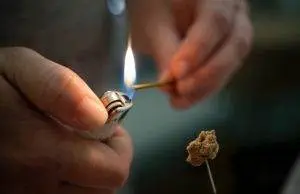
Moxibustion treatment–the burning of the herb mugwort near an area–can be very effective for reducing pain quickly. Chinese herbal formulations, used both internally and externally, can help relieve inflammation and pain. An herbal tea formula may include herbs to help strengthen the energy of the spleen, and to lubricate the digestive tract.
We also recommend sitz baths as a home remedy for hemorrhoids: short, 15-minute baths in warm water, to help soothe the area and keep it clean. Your acupuncturist may give you an herbal bath sachet to use to help reduce inflammation and soother the tissues.
One study of acupuncture treatment for internal hemorrhoids showed that, after 24 days, 86% of patients were “cured,” while another 8% showed significant improvement.
Your acupuncture practitioner will also talk with you about changes you can make in your diet and bathroom habits that will help you get things moving more easily.
Acupuncture Near Me for Hemorrhoids
Hemorrhoids are not only irritating; they are a sign that you may need to pay more attention to what you’re eating, and that you need to give yourself a little more time for relaxation, in and out of the bathroom. A combination of acupuncture, herbs, and other TCM treatment for hemorrhoids can help get the pain and swelling behind you.
*This article is for education from the perspective of Traditional Chinese Medicine only. The education provided by this article is not approved by FDA to diagnose, prevent, treat and cure human diseases. It should not stop you from consulting with your physician for your medical conditions. Traditional Chinese Medicine is based on Qi, which is an invisible force that usually cannot be observed by modern science. Because science focuses on testing ideas about the natural world with evidence obtained through observation, these aspects of acupuncture can’t be studied by science. Therefore acupuncture and Chinese herbs are often not supported by double-blind, randomized trials, and they are considered alternative medicine therapies in the United States.
How To Treat Dizziness With Acupuncture and TCM
By Qineng Tan, L.Ac., Ph.D. & Xiaomei Cai, L.Ac., Ph.D.
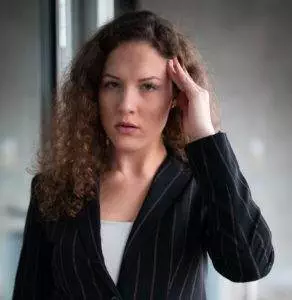
Feeling light-headed and dizzy? Maybe you feel like your head is spinning, or that the world is spinning around you? Headache, nausea, dizziness, and vertigo are symptoms that can be caused by a variety of health problems. Acupuncture and TCM offer vertigo treatment that can help relieve that sense of dizziness and nausea, or feeling light-headed and tired all the time.
Feeling dizzy is one the most common reasons that people go in for a doctor’s visit, or even visit the emergency room. Dizziness is a fairly general term that can mean anything from feeling light-headed, woozy, faint, off-balance, or unsteady to feeling nauseated or like you’re about to pass out.
Vertigo is a specific type of dizziness that refers to a sensation of spinning, as if the room around you is moving. You might feel like you’re leaning to one side, or about to fall over. It can make you feel sick to your stomach, similar to motion sickness. In popular culture, the word “vertigo” is sometimes used to mean a “fear of heights,” but that is actually called “acrophobia.” The sensation of vertigo can be triggered by looking down from above, or looking up at something very tall, but this is not the cause of most episodes of vertigo.
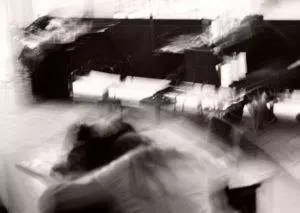
Vertigo causes include migraines and problems with the inner ear. The inner ear and eyes both relay information to the brain about a person’s spatial relation to the environment, so when the functioning of the eyes or ears is disrupted, it can cause a sense of imbalance, and even nausea. Migraine headaches, particularly a specific type called a vestibular migraine, can cause pressure in the head and dizziness and nausea.
Benign paroxysmal positional vertigo (BPPV) is one type of vertigo that causes short-term bouts of sudden dizziness. Benign positional vertigo is caused by the shifting of calcium crystals (canaliths) in the inner ear. This can happen due to a head injury or simply aging.
Other inner ear problems that can cause signs of vertigo include Meniere’s disease and Labyrinthitis. Meniere’s disease is a chronic disorder related to abnormal amounts of fluid (endolymph) collecting in the inner ear. The exact cause of Meniere’s is unknown, but it develops more frequently later in life. Meniere’s disease causes attacks of vertigo that can last from a few hours up to 24 hours. Like migraines with an aura, there is often a period of time during which a set of “warning symptoms” begin to occur, such as: a feeling of uneasiness, being off-balance, headache and dizziness, queasiness, hearing loss or ringing in the ears, or extra sensitivity to sound. Once an attack of vertigo hits, it can be quite severe, causing intense pressure in the ear, blurred vision, vomiting or diarrhea, cold sweats, rapid heart rate, and feelings of fear and panic. There is currently no cure for Meniere’s.
Labyrinthitis refers to inflammation of the small parts of the inner ear, or around the nerves of the inner ear that can be caused by viral or bacterial infections, such as: a flu, measles, herpes, hepatitis, Epstein-Barr, chicken pox, or childhood ear infections. Symptoms of labyrinthitis can include: dizziness, nausea, tinnitus (ringing in the ears), and difficulty concentrating.
Lightheadedness is a similar sensation to dizziness in some ways, but is usually caused by a sudden change in blood pressure or the flow of blood to the head. You have probably experienced feeling light headed and dizzy when you get up too fast from sitting or lying down. Other causes of lightheadedness include: allergies, anxiety, anemia, hyperventilating, arrhythmia, or heavy bleeding (as during menstruation).
Dizzy spells happen to everyone once in a while. But recurrent headache and dizziness should be addressed. Acupuncture and TCM have been used to help dizziness for thousands of years and offer natural solutions to the underlying causes of vertigo.
Top 10 Causes of Dizziness

Feeling light headed and dizzy, or having headache, nausea, dizziness, can occur as symptoms of a variety of imbalances. Reasons for dizziness may include:
- Inner ear imbalance, or labyrinthitis
- Meniere’s disease
- Sleep apnea, snoring
- Migraine – vestibular migraine
- Dehydration – alcohol, diuretics
- Sinus issues
- Ear infection
- Low Blood Sugar – diabetes, hypoglycemia
- Multiple Sclerosis (MS)
- Prescription Medication side effects
Dizzy spells that occur first thing in the morning are common for some people. This can be simply due to the change in pressure in the ear when you get out of bed. Waking up dizzy due to sleep apnea occurs because this condition obstructs your breathing during the night, and you may have lower oxygen levels when you wake up. Being dehydrated is another common cause of dizziness, which is exacerbated by drinking alcohol before bed. In general, drinking too much caffeine, too much alcohol, and not enough water, or taking diuretics can all lead to dizzy spells. Low blood sugar, whether due to diabetes, or simply not eating regularly enough, can also be a cause of light-headedness. Hepatitis, HBV, or HCV can also cause dizziness.
Postural orthostatic tachycardia syndrome (POTS) causes dizziness when moving from a seated or position or lying down to standing up.
Cervical vertigo, or cervicogenic dizziness, is another type of vertigo caused by the positioning of the neck or cervical spine; in this case, the feelings of imbalance and spinning may be accompanied by neck pain. This type of vertigo may happen, for instance, after a whiplash injury.
Treatment for Vertigo
The medical treatment for dizziness and vertigo depends wholly on the underlying causes for the symptoms. If a bacterial infection in the ear is confirmed, then antibiotics may be used. In cases of BPPV, a canalith repositioning procedure (CRP) is a non-invasive technique that can help the crystals within the inner ear move back into their proper place. Migraine-related vertigo may be treated with the medications typically prescribed for migraines. Anti-nausea drugs like Dramamine may be suggested. Patients suffering from cervical vertigo may be referred to physical therapy to help improve the positioning and strength of their neck/cervical spine.
Can Acupuncture Help Dizziness?
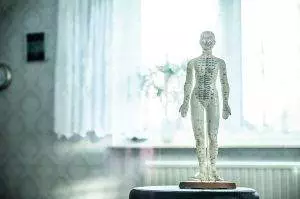
One of the central concepts of TCM is that of the root and the branches. The branches are the visible, outward signs or symptoms of a problem, while the root refers to what is going on deeper in the organ systems of the body. In the cases of dizziness and vertigo, there is deficiency in the root and excess in the branches.
Pathogenic factors involved in dizziness and vertigo are phlegm, wind, fire, and deficient Qi. When there is weakness in organs like the spleen, stomach, kidney, or heart, pathogens like wind, heat, and phlegm can take hold. The San Jiao, also known as the “triple burner,” is another important concept in TCM; one of its primary functions is to control the movements of fluids in the body so that they don’t collect and build up inappropriately. In case of vertigo, phlegm and heat develop to the point of causing stagnation and malfunctioning of the Jiao, pushing phlegm upwards in the body. An acupuncture practitioner will carefully listen and observe to discover which organ systems are out of balance, and work to strengthen those areas. For example, dizziness combined with emotional disturbances like anger and depression is a sign of too much wind or heat in the Liver. Weakness in the heart or spleen may follow a long illness or period of stress and anxiety. Too much phlegm, heat, and dampness in the stomach and spleen can result from an improper diet and too much stress.
Acupuncture and herbs to tonify these organs and clear heat and phlegm will take care of the root of the dizziness. Meanwhile, specific acupuncture points can have an almost immediate effect at relieving immediate discomfort, facilitating a natural vertigo cure.
A study conducted at a hospital in Taiwan used acupuncture to treat patients with dizziness and vertigo. The findings conclusively showed immediate improvement in symptoms.
A study of 60 patients who were admitted to an emergency room suffering from vertigo from a variety of causes, including Meniere’s and BPPV, showed that acupuncture treatment provided immediate relief of symptoms and is therefore a good alternative for dizziness due to various causes.
Top 5 Tips to Get Rid of Dizziness
Depending on the cause of the vertigo, there are different ways to manage with TCM techniques, including vertigo exercises, acupressure for dizziness, moxibustion, and foods to avoid.
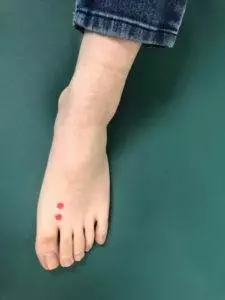
Major 4 types of Vertigo/Dizziness presentation:
- Hypertension type – When a person has high blood pressure, too much liver yang, and is overheated, it can cause dizziness. For this, we use acupressure Liver points 2 and 3 on the toes.
- Qi and Blood deficiency – if a person shows signs of anemia, or has heavy periods, hemoglobin is low, or if a person has chronic conditions, or has suffered a major injury, or recently given birth, experienced major blood loss. For this we want to ensure a good diet with plenty of soups and easy to digest foods. Moxa on the back can help to strengthen the body’s Qi and produce enough blood. Qi Gong exercise of squeezing the earlobes and outer ear up and down is helpful.
- Kidney essence deficiency – this could be due to some constitutional weakness, or due to old age, or someone who tends to have chronic illness, diarrhea. The kidney essence can’t support rising essence to the head. For this, acupressure for Kidney 1 – on the bottom of the foot.
- Phlegm stagnation – when the middle jiao is not working due to stagnation of phlegm creating blockage so Qi cannot ascend. This happens when people are overweight, or have poor digestion, diarrhea. Avoid dairy and fried foods, which encourage phlegm. Moxibustion treatment to the back is helpful, and applying pressure to Stomach-36 acupressure point can help the middle jiao open up.
- Neck Pain – if a neck problem is causing a blockage, due to a neck disease or bulging disc, unhealthy cervical disks, compression, tension, and muscle spasms can block upwards energy. Exercises to encourage the health of the neck discs, loosen up the muscles and allow flow of Qi and blood up to the head. Your acupuncture practitioner will recommend neck exercises to help with this.
Acupuncture Near Me for Dizziness
Vertigo and dizziness may not be life-threatening symptoms, but they can have a big impact on your daily life. Frequently being blindsided by unexpected dizziness, spinning sensations, nausea, and headaches is unsettling and debilitating. Medications can be helpful in some cases, but they can also cause unwanted side effects. Getting to the root cause of vertigo with acupuncture and TCM will help get rid of dizzy spells so they don’t keep coming back.
*This article is for education from the perspective of Traditional Chinese Medicine only. The education provided by this article is not approved by FDA to diagnose, prevent, treat and cure human diseases. It should not stop you from consulting with your physician for your medical conditions. Traditional Chinese Medicine is based on Qi, which is an invisible force that usually cannot be observed by modern science. Because science focuses on testing ideas about the natural world with evidence obtained through observation, these aspects of acupuncture can’t be studied by science. Therefore acupuncture and Chinese herbs are often not supported by double-blind, randomized trials, and they are considered alternative medicine therapies in the United States.